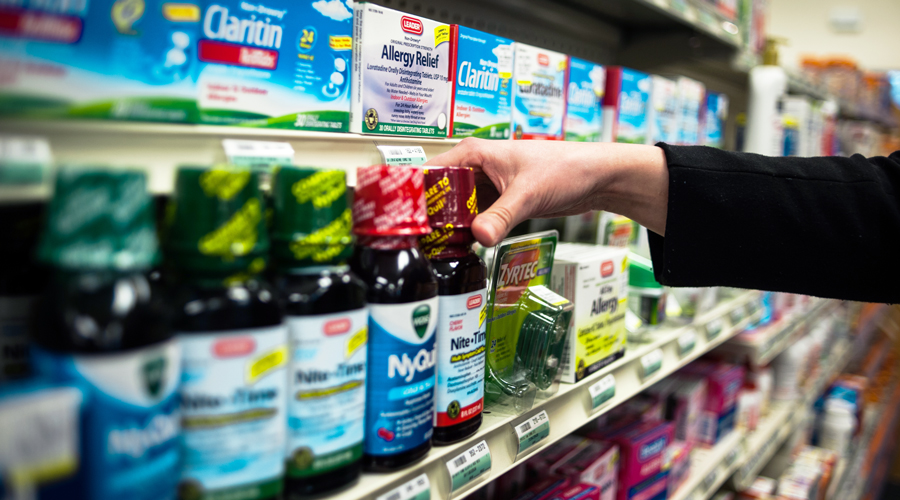A new health care trend has patients doing more themselves. Do-it-yourself, or DIY, health care is a growing trend, and your pharmacy has an important role to play.
A combination of factors, including a shortage of primary care physicians, increased interest in clean eating and easy access to health information through the web, are contributing to this trend that has patients dealing with more health issues themselves.
As an independent community pharmacist, you can take advantage of this trend to grow your business and help your patients.
Patients will need products and information in their attempts to improve their health, such as managing small colds, setting their own diets and tracking their body metrics. Boost your bottom line by learning more about common areas in the growing DIY health care trend, and how your pharmacy can help interested patients.
1. Cough and cold
Long waitlists and difficulties making appointments at doctors’ offices are driving patients to skip the visit to the doctor, and instead, treat a cold or cough themselves. These patients often turn to pharmacists, too. A recent study found that a majority of patients were satisfied with pharmacists’ advice for treatment of cough and cold symptoms.
These DIY patients need advice on what front-end products will quell their symptoms. Come out from behind the counter and consult with patients about what products will help; make sure to keep a large stock of cough drops and cough syrup and advise them on what they can do to help keep others in their household healthy. Without a doctor’s visit, these patients might not fill a prescription, but with your advice, their purchases from your front end might end up as an even larger sale for your pharmacy.
2. Nutrition workshops
Patients are becoming more interested in eating healthier. That may mean cutting out genetically modified organisms (GMOs) and sugar, or just trying to eat more fruits and vegetables. Other patients are modifying their diets in an attempt to address food allergies, such as gluten or dairy products.
You can host a workshop about nutrition, or devote more time to consulting patients about what to eat or what to avoid with their prescription regimen. Some patients might be interested in learning more about health food trends, like probiotics or certain diets. Share your knowledge, feature healthy snacks in your front end and consider charging for the time and nutrition information you share with your patients.
3. Medication consultation
Patients are more concerned than ever about what they’re putting into their bodies. During your usual consultations, help alleviate their concerns about their prescriptions by walking them through what the drugs do to their bodies. Also, let them know what add-on products could help them.
For example, if your patients want to use vitamins or supplements, let them know what ones would be best to pair with their medications. Recommending vitamins and supplements to your patients can help them feel more balanced, and the additional front-end sale will boost your bottom line.
4. Mobile devices and monitoring vitals
More apps and devices are constantly being developed to give patients more DIY health care tools. Already, applications and devices exist that can transform smartphones into portable EKG machines, glucose monitors and more. Technology gives patients more power to track their own health, and research shows that patients are more comfortable using it than ever.
You can help your patients by keeping up with the latest in technology, and knowing what apps and devices can help your patients reach their health goals. Educate patients who are tracking their vital signs about what their numbers represent, where they’re at regarding their target numbers and how they can reach their goals. This information is valuable and when you provide it, consider charging for your time and knowledge.
5. Children
For children, an occasional upset stomach, runny nose or scraped knee doesn’t usually warrant a trip to a doctor. Instead, many parents know, and employ, a little DIY medicine to take care of their children.
Your pharmacy can help by stocking flavored medicine for children, and recommending products that will help children get better faster, like drinks that help replenish electrolytes when someone has the stomach flu, or durable waterproof bandages for children who are eager to get back to play.
Your experience as a health care professional can also often help parents to evaluate the situation. This might mean calming down an anxious parent, or noticing a child’s coughing and wheezing has gone on too long, and advising parents to make an appointment with their doctor.
6. Allergies
For hay fever and seasonal allergies, many people turn to home remedies and over-the-counter treatments to relieve their symptoms, rather than going to a doctor.
Make your pharmacy the go-to spot for DIY allergy relief by boosting your selection of products to help alleviate symptoms. Stock items like gel-cooling masks along with over-the-counter allergy relievers. Also, for people with food allergies, like gluten, consider selling snacks that are compatible with different allergies, and make sure you know which vitamins to recommend for people with different food allergies.












